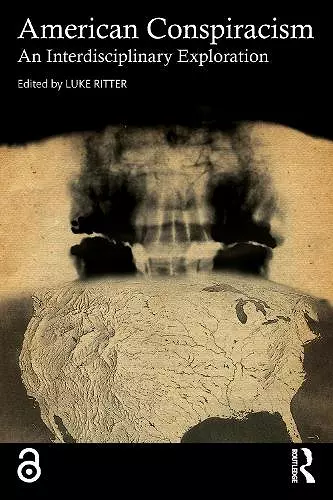American Conspiracism
An Interdisciplinary Exploration
Format:Paperback
Publisher:Taylor & Francis Ltd
Published:2nd Jul '24
Currently unavailable, and unfortunately no date known when it will be back
This paperback is available in another edition too:
- Hardback£135.00(9781032604633)

This important collection explores the social effects of popular American conspiratorial beliefs, featuring the work of 22 scholars representing multiple academic disciplines.
This book aims to better understand the phenomenon of American conspiracism by investigating how people acquire their beliefs, how conspiratorial stories function in politics and society, the role of conspiracy theories in the formation of national identities, and what conspiratorial beliefs mean to individual believers. Topics include QAnon, the Boogaloo Boys, the satanic panic, the Martin Luther King, Jr. Assassination, the Great Replacement Theory, anti-Catholic nativism, Flat Earth belief, Elvis Lives, COVID-19 denial, and much more. Each essay is accessibly and engagingly written without compromising quality.
American Conspiracism is essential reading for students of psychology, political science, and U.S. history, as well as journalists, independent researchers, and anyone interested in American conspiracies.
Chapter 5 of this book is freely available as a downloadable Open Access PDF at http://www.taylorfrancis.com under a Creative Commons [Attribution-Non Commercial-No Derivatives (CC-BY-NC-ND)] 4.0 license.
"Conspiracy theories have quickly become a major part of mainstream political rhetoric, yet scholars have been slow to fully investigate how these theories come to be, and the role they play in affecting social and political outcomes. Further hindering our understanding is the fact that conspiracy theories, due to their numerous causes and consequences, cannot be fully understood from only one disciplinary lens. In this expansive volume, Luke Ritter has assembled some of the brightest minds from across disciplines to forge a new and more complete understanding of how conspiracy theories help or hinder knowledge, the roles conspiracy theories play in society, and what the emergence of conspiracy theories mean for politics and policy. I strongly recommend this important volume for anyone interested in better understanding conspiracy theories."
Joseph Uscinski, Ph.D., Professor at University of Miami, USA, Author of American Conspiracy Theories (2014) and Editor of Conspiracy Theories and the People Who Believe Them (2018)
"The editor and authors behind this book have conspired to produce a scholarly work of deep importance and insight. Why do people believe conspiracy theories? This collection shows that the answers are as complex as the theories themselves. Rather than setting out to dismiss conspiracism as a collection of crackpot ideas or a contemporary crisis, these essays offer an open-minded and rigorous exploration, charting historical throughlines up to the present. Plenty of light is shed on particular ideas and political moments, from 19th-century anti-Catholicism to the death of Elvis. Yet deeper down the rabbit hole it becomes clear that this kind of interdisciplinary effort offers broader insights into how we come to believe anything, and how we function as a society when information and authorities can't always be trusted. This book is essential reading for anyone who wants to understand American conspiracism in all its complexity and contradictions."
Rob Brotherton, Ph.D., Lecturer at Barnard College, USA, Author of Suspicious Minds: Why We Believe Conspiracy Theories (2015)
"In the past decade, scientists and practitioners increasingly have realized the prevalence and impact of conspiracy theories in contemporary society. This book offers a fresh, out-of-the-box perspective on conspiracy theories in an American context. How do people construct conspiracy theories, what are their effects, how do conspiracy beliefs relate to nationalism, and what do conspiracy theories mean for the people who believe in them? In 15 innovative essays, scholars from across the humanities and social sciences share their views on these important questions. Each author builds their argument around a case study, such as QAnon, Flat Earth belief, the Satanic Panic, the Ku Klux Klan, the Martin Luther King assassination, COVID-19 denial, and many others. This book is a must-read for anyone interested in the causes and consequences of conspiracy theories."
Jan-Willem van Prooijen, Ph.D., Endowed Professor of Radicalization, Extremism, and Conspiracy Thinking, Vrije Universiteit Amsterdam, Netherlands,Author of The Psychology of Conspiracy Theories (2018)
ISBN: 9781032604626
Dimensions: unknown
Weight: 500g
314 pages